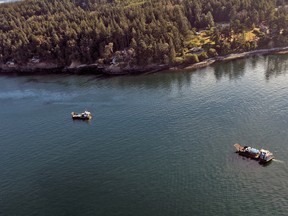Whales are unable to detect or avoid slicks, increasing the risk of inhaling or ingesting the contaminants.

Conservation group releases whale sightings along British Columbia to public. The coast as oil spills from sunken fishing vessels reach Canadian waters.
Real-time whale whereabouts information will help efforts to keep marine animals, especially the endangered southern killer whales, out of oil slicks. There is a possibility.
"He's only 73 left," said Chloe Robinson, Senior Manager of Protective Effects at Ocean His Wise. "When they pass through an area with oil fuel, it can really affect their health." It sank off the west coast of San Juan Island, spilling about 10,000 liters of fuel.
Sixty of the 73 endangered whales were reported to be south of the spill when the ship sank. No whales have been identified in the affected areas, according to the U.S. Coast Guard.
The last sighting of the southern resident killer whale was in waters served by a ferry between Washington and Victoria on Sunday. They were spotted heading west away from the slick by a group of researchers on the ferry. But whales can change direction easily, and areas where boats have sunk are important feeding grounds for whales, Robinson said.
Killer whales cannot avoid slicks and are at increased risk of inhaling or ingesting contaminants. Exposure to oils and toxic vapors can lead to skin irritation, internal damage and even death.
Robinson said it was important to keep an eye on the coast. Her plea to report whale sightings isn't just for boaters on the water, she added. Most sightings come from people on the coast.
Sightings can be reported in real time through the Ocean Wise WhaleReport app, which can be downloaded to your smartphone.
Alert Her system then broadcasts whale sightings to authorities such as the Coast Guard, Transport Canada and the Canadian Fisheries and Oceans Office (DFO).
If a whale gets too close or is in danger of swimming through an oil slick, authorities can use methods such as noise and underwater firecrackers to keep them away.
This is her one of the first instances where an app was used for this purpose, Robinson said. In the past, it was primarily used to signal the location of whales to ships in order to reduce the risk of collisions with ships.
"With the oil discharges associated with the San Juan shipwreck, it's important to know where marine mammals are in real-time," said DFO marine mammal expert Paul Cottrell. mentioned in the release. "This will allow our team to react in real time to reduce exposure
preventing killer whales from swimming into polluted waters impacts salmon and whales. It is just one of the steps to deal with the consequences of a potential oil spill.' Primary prey, and other marine life.
'Even after the spill has been cleaned up, residual oil, The fuel, the hydrocarbons, will remain and will continue to be a threat,' she said. .com
twitter.com/cherylchan

Division of Postmedia Network Inc. Sign up to receive daily headline news from the Vancouver Sun.
Thank you for registering.
Welcome sending her email. If you don't see it, please check your spam folder.
The next issue of the Vancouver Sun Headline News will arrive in your inbox shortly.


